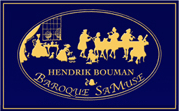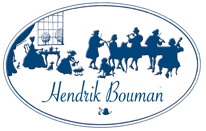EARLY MUSIC AMERICA 2007
"A NEW BAROQUE REVIVAL - Breaking through the final taboo."

EARLY MUSIC AMERICA 2007
"A NEW BAROQUE REVIVAL - Breaking through the final taboo."
have contributed throughout my career as soloist, accompanist, conductor, educator, and, for over a three decade, as improviser and composer of Baroque and Classical music.”
But what is it about composing new Baroque or period music that makes people pursue it with little or no support from the musical world?
Says Bouman, "Reason one, to fully treasure my favorite kind of music; I see it as a language – with its idiom and its grammar, its vocabulary, its regional accents, its expressions and expressiveness – in which I have learned to express myself over the years while performing. Reason two, to enjoy performing music that I compose, the natural twin aspects of musicianship. Reason three, because this is the next logical and unavoidable step in early music’s pursuit for historical authenticity – to do as they did.”
So what does the future hold for this new music of the past? In addition to the release of his new book, Bruce Haynes will be chairing a round table discussion on period composition at this year’s Montreal Baroque Festival called, “Heaven or Hell, An End of Early Music!”
Also scheduled to appear at the June event are Hendrik Bouman and Matthias Maute, who will be playing some of their own compositions. In addition to the discussion, Bouman has plans in the coming months to premiere several compositions for a a variety of formations: a duetto for recorders, a sonata for oboe, a sonata for flute and continuo, a paritita for flute solo, a French character piece for gamba and continuo, and several harpsichord and fortepiano pieces.
Grant Colburn, Early Music America, Summer 2007
Harpsichordist and conductor Hendrik Bouman, formerly of the early music group Musica Antiqua Köln, has been putting on concerts and premiering newly written Baroque works...
Bouman inaugurated his Montreal concert series, “Baroque SaMuse,” in December 2006. His innovative programming features new Baroque and Classical compositions written in the styles prevalent in 17th- and 18th-century Germany, France, Italy, England, and Spain ex tempore period improvisations,and transcriptions of the historical repertoire of the masters, all performed by Bouman, his colleagues, and guest soloists.
But what about the music itself? Surely most performers and artists have had the assignment at university to write a short invention or fugue for a theory class. But how many have continued to pursue writing, playing, and performing new music in the early styles?
Hendrik Bouman: “It was completely natural for musicians of the 17th and 18th centuries to compose, to improvise and create variations ad infinitum, as well as to perform. Would you not agree, therefore, that we may also honor the heritage of the great masters – its inherent sublimity, the semantics of its symbolism, the clarity of its sonorities, the wealth of its spontaneous ornamentation, the swaying rhythms of its dances, and the evocative gestures of its pantomimes – by composing anew in the idioms they held dear?
To embrace again this wonderful integrality, which in our time is still current in most musical genres the world over, represents for me a logical and necessary evolution in the authenticity movement in early music, to which I

*



